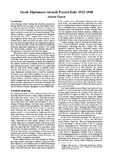Greek Diplomacy towards Fascist Italy, 1922-1940
| dc.contributor.author | Klapsis, Antonis | |
| dc.date.accessioned | 2016-04-04T12:00:20Z | |
| dc.date.available | 2016-04-04T12:00:20Z | |
| dc.date.issued | 2013 | |
| dc.identifier.isbn | 978-3447-06890-1 | |
| dc.identifier.uri | http://hdl.handle.net/11728/7395 | |
| dc.description.abstract | Greek foreign policy during the Interwar period was heavily affected by the legacy of the Asia Minor Disaster. After the signing of the Peace Treaty of Lausanne (24 July 1923), Greece’s strategic aims focused on safeguarding its national security and its territorial integrity. Thus Athens, with the exception of the period of the Pangalos dictatorship (June 1924 – August 1925), became an ardent supporter of the status quo. In this context, it was evident that in order to achieve its aims, Greece had to reach an understanding with its most important neighbor: Italy. | en_UK |
| dc.language.iso | en | en_UK |
| dc.rights | Copyright der Autoren | en_UK |
| dc.rights.uri | http://creativecommons.org/licenses/by-nc-nd/4.0/ | en_UK |
| dc.subject | Greek Diplomacy | en_UK |
| dc.subject | Fascist Italy | en_UK |
| dc.subject | 1922-1940 | en_UK |
| dc.title | Greek Diplomacy towards Fascist Italy, 1922-1940 | en_UK |
| dc.type | Book chapter | en_UK |
Files in this item
This item appears in the following Collection(s)
-
Book chapters26
Κεφάλαια βιβλίων


